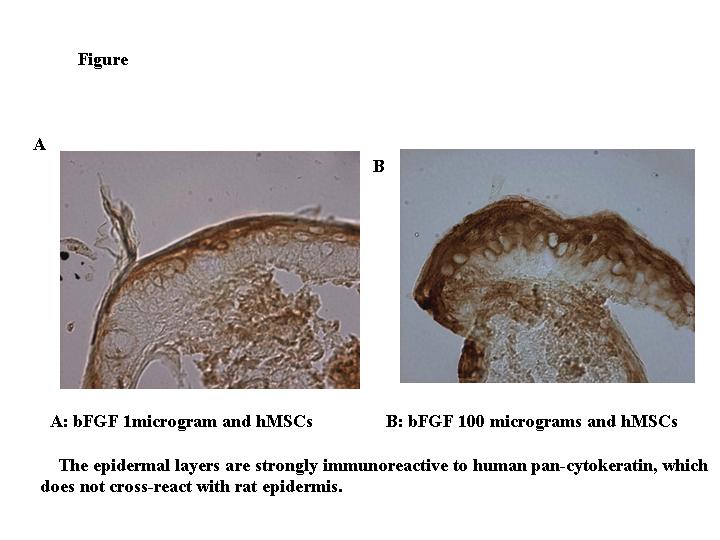Wednesday, October 29, 2003
3684
P12: Initiated Mesencymal Stem Cells Successfully Heal the Cutaneous Wound with a Collagen Sponge Artificial Skin Substitute
To facilitate cutaneous wound healing in difficult circumstances and to replace conventional therapeutic modalities, highly purified bone marrow-derived human mesenchymal stem cells (hMSCs) were investigated for the acute cutaneous wound healing upon a growth factor in vitro and the wound defect model in vivo. For possible cell-medicated transplantation toward wound healing, the cell kinetics were tested by basic fibroblast growth factor (bFGF), which is well-characterized and documented growth factor for brain cortical precursor cells (cortical stem cells).Human mesenchymal stem cells (hMSCs) obtained from a single donor from the iliac crest, were investigated with cutaneous wound healing models using nude rat, eliminating T cell-mediated immune reaction to the grafted stem cell of human origin. The hMSCs significantly increased their cell number by day 2 by basic fibroblast growth factor (bFGF) in the serum-free condition (P<0.01). Proliferating cellular nuclear antigen (PCNA) expressions by bFGF treatment to hMSCs demonstrated much stronger expression level compared to hMSCs alone or medium alone at day 1 and 2.
1.5 x1.5 cm2 dorsal full-thickness defects including panniculus carnosus of F344/NJCl-rnu nude rats were covered by bi-layered collagen sponge artificial skin substitutes (Pelnac®) impregnated with 5 x106 hMSCs grated to along with 0, 1, 10, or 100 µg of recombinant human basic fibroblast growth factor (bFGF). The tissues were harvested at 3, 7 and 42 days after grafting. The defects were remarkably epithelialized by 7 days after artificial skin substitutes and 10 µg of bFGF, while artificial substitutes with no hMSCs or artificial skin substitutes with hMSCs alone did not exhibited such healing. By 42 days after grafting, artificial skin substitutes with hMSCs and any dose of bFGF demonstrated the total epithelization and the keratinocytes by this treatment exhibited the pan-cytokeratin of human origin by immunohistochemical expressions by 42 days (Figure). These results suggest that the human mesenchymal stem cells may be utilized for wound coverage together with bFGF and artificial skin substitutes.

